- Home
- Craig Schaefer
A Plain-Dealing Villain Page 6
A Plain-Dealing Villain Read online
Page 6
“I’ll take it under advisement. You looking for work?”
“With you? Oh, no. Not as long as that lady fed’s got a hard-on for ya. You’re too hot, Dan. You need to go underground for a while. Maybe a long while. You’re radioactive until this blows over.”
“The score’s not here. It’s in Chicago.”
Coop took a pull on his bottle. “I’m listening.”
“Jewelry store. Snatching a particular item for a particular client. In-and-out job, no muss, no fuss. Maybe a little weird stuff. I’ll handle that, though.”
“I don’t like the weird stuff, Dan.”
“And I said I’ll handle it. The payoff’s thirty grand on a three-way split. We’ll need a local for a wheelman. Three percent, off the top, goes to Nicky Agnelli. He’s playing matchmaker on this one.”
“And five percent for Augie,” Coop said. He tilted his head and looked at me, bottle lightly touching his lips, like he was daring me to say no.
“And five percent,” I said, resigned, “for Augie.”
“When’s it going down?”
“As soon as possible.”
Coop squinted, doing the math in his head. “Two days. I can’t exactly fly with my gear as carry-on luggage. I’ll load up a van and drive to Chicago. Me and Augie’ll take shifts, get us there faster. You find your wheelman yet?”
“Haven’t started looking. Why? You know one?”
“Might,” he said. “Guy named Stanwyck. I’ve worked with him a couple of times. He’s reliable. Originally from Chicago, but he relocated to Vegas about two years ago.”
“Can’t imagine the streets have changed that much in two years. Okay, if you vouch for him, he’s in. Do the honors?”
Coop finished his beer. He set the empty bottle down on the edge of the bar.
“I’ll have him get in touch. See ya in Chi-Town, Dan.”
* * *
The next morning, I made a little detour on my way to the airport. The doors of St. Jude’s opened with the sun, inviting Las Vegas’s down-and-out to start their day with a hot meal. I crossed the scuffed parquet floor of the dance-hall-turned-soup-kitchen, edging around the serving line, and waved at one of the servers.
Pixie and I had gone through some rocky times lately, but she still called over another volunteer to take her spot so she could come around the tables and talk to me. Streaks of icy white adorned her dyed scarlet hair, and she wore a camisole top that showed off the fairy wings tattooed along her slender shoulder blades.
“I’m here to make a donation,” I told her, peeling off a couple of hundreds from the wad of cash Fleiss had given me.
“In exchange for?”
“There’s this guy, Cameron Drake. He won the lottery in Texas about a year ago, withdrew all the money in a lump sum, and bought a ranch outside Austin. I took a job from the guy, but something’s hinky about the whole situation. I want anything you can dig up on him: what he knows and who he owes.”
“Yeah, all right.” She flashed an X drawn in black Sharpie on the back of her hand as she curled her fingers around the bills and tugged them away. “I’ll be your Google.”
“Keep an eye out for the names Fleiss and Pachenko. Supposedly they work for him.”
“Supposedly?”
“Like I said, something’s hinky.”
“St. Jude’s,” she said, turning back towards the serving line, “appreciates your generous donation.”
Out on the street, keys in hand, an idea hit me. Harmony Black was good. Really good. Obviously she was using magic to track me, but I didn’t realize how thick a net she’d woven until I started looking. A chalked sigil on the sidewalk outside Bentley and Corman’s bookstore, another etched in blue dust on a wall halfway down Fremont Street. Everywhere I went, all my usual haunts, I’d started catching the signs. That wasn’t enough, though. To know about my trip to Henderson Executive Airport yesterday, she had to be tracking one of two things: me, or my ride.
I went over the Barracuda inch by inch, holding my open palms over the sleek black steel and concentrating like an occult auto mechanic, until I finally found her handiwork. She’d placed it under my back bumper, an enchantment veiled under layer after layer of gossamer illusion. I never would have found it if I hadn’t been looking, and looking hard.
The witch-eye would have been invisible to most people. In my second sight, it looked like its name: a disembodied, veiny eyeball stuck to the inside bumper with a lump of watery tissue and clotted blood. The eye lolled left and right, its blood-red iris taking in everything around it. As long as the eye was in place, Harmony could find my car anywhere just by concentrating on it.
Good. I was counting on that.
I drove over to McCarran International, parked the Barracuda in long-term, and pocketed my parking ticket. I kept an urgent stride on my way to terminal one, a canvas messenger bag slung over one shoulder, moving with purpose but not so fast I’d stand out in a crowd. I’d flipped over an hourglass by coming here, and I could feel the sand draining away with every passing second.
People like me don’t get along with banks too well, but they have their uses, especially when it comes to building a cover as a solid citizen. On paper, Daniel Faust was a self-employed “street entertainer” who operated right below the poverty line. He had a bank account with a tiny balance, a debit card, and he filed his papers with the IRS every April like a good taxpayer should.
I had a pretty good hunch that Harmony was watching that bank account like a hawk, which was why I made a beeline for the Southwest Airlines desk and bought a 2:15 ticket for Austin with my debit card.
Peter Greyson was another good citizen, though he’d been unemployed for a while since his software company out in Los Angeles went belly-up. He had a bank account of his own and bulletproof papers, courtesy of my buddy Paolo. Peter Greyson and Daniel Faust had never met. Peter bought himself a ticket to Chicago on American Airlines, due to leave in an hour, and dumped the Austin ticket in the nearest trash can.
I shuffled through security as Peter, flashing my bogus driver’s license and a harmless smile, taking off my belt and shoes to trudge forward with the rest of the crowd. Solid fake IDs were a lot harder to come by post-9/11, but there were still plenty of loopholes the feds hadn’t gotten around to closing. My messenger bag slid through the scanner like silk. There wasn’t much in it but a change of clothes, toiletries, and a few pieces of gear for the job. Nothing too eyebrow-raising, much less illegal.
The Austin flight was leaving from gate A8. My Chicago flight was D10, on the far side of a tram ride. I stood at the glass tram doors in a milling, listless pack of tourists, waiting for the next car to arrive.
The back of my neck prickled. I tensed, sending out psychic tendrils—then immediately yanked them back like I’d brushed my fingertips against a hot stove. Fifty feet away, Harmony Black cut through the crowds at full steam, trailed by three junior G-men in off-the-rack suits.
If she so much as glanced to her left, I was finished. I could see her own senses reaching out, touching the faces around her like a thousand wavering violet sea anemones, hunting for my scent. I locked down. Pulled my magic in hard, threw up walls of iron around my mind, and shuffled deeper into the waiting crowd, trying to cut the line of sight.
I could see the tram coming through the tunnel of glass, puttering toward the station. Twenty seconds. I just needed to hold out for twenty seconds—
Harmony froze in her tracks. Her pals almost tripped over each other, stumbling to a halt. One asked something and she waved him away. She tilted her nose up in the air. Sniffing.
I felt her senses touch mine, drifting over me like a lace veil. I crouched down inside my own mind, throwing up a confusion of symbols and images, a burst of random mental static to throw her off.
The veil paused, resting over me for a heartbeat. Then it moved on.
The tram doors slid open. I hustled on board and grabbed a standing pole, clenching every muscle in my body until the
doors rattled shut again and the tram pulled away from the concourse. I watched the concourse slide away, leaving Harmony Black behind. Even so, I didn’t feel safe until I was on the plane, nestled in a window seat near the wing and feeling the engines rumble as we taxied up the runway.
* * *
We hit turbulence somewhere over the Rockies, and then the silver clouds turned black like mottled iron. The “fasten seat belt” light chimed on and never turned off again. While the jet rattled and shook and lightning flashed off in the distance like the cannons of a pirate galleon, I tried to focus my attention on the in-flight movie. It was a romance flick where the hero got cancer and died in the end. I was not comforted.
Three hours later we broke through the clouds. Chicago sprawled below us, a bristling parasite of steel and stone clinging to the curve of Lake Michigan. Skyscrapers rose up from the urban expanse like the pistons of a mighty engine, standing tall and sharp in the rainy gloom.
Home was sin and sleaze and glitz in the desert sun. Vegas would steal every penny in your pocket, but it’d make sure you had a great time on your way to the gutter. Chicago didn’t have time to play games. It was a machine for printing money, moving at the speed of industry, and it only offered two choices: keep up or be left behind.
Las Vegas was born from a gangster’s dream of fleecing tourists in paradise. Chicago was born from a trading post, built on the bones of an Indian massacre. Neither city has ever forgotten this.
We touched down on the runway at O’Hare, the jet screaming as it put on the brakes, and I let out a breath I hadn’t realized I’d been holding. I was a stranger in a strange land, but at least now I had both feet on the ground.
There was a message from Stanwyck on my phone. He kept it short and sweet. “This is Coop’s friend. He gave me your number. I’m interested in that project you talked to him about. Give me a call.”
Good, one less problem to deal with, now that I had a full crew for the job. Overfull, if you counted Augie. My stomach grumbled as I joined the conga line to shuffle off the plane, inch by inch and toe to heel. Food first, I thought. Then call him back. Then figure out where I’m sleeping tonight.
O’Hare felt like a relic of the 1970s. Plenty of white paneling, white floors, the kind of white that gets grimy ten minutes after it’s been mopped clean. It felt like an overcrowded office building buried under a thin layer of grit. I found a small food court and grabbed a cheeseburger and an order of fries at a McDonald’s kiosk. I’m all for sampling the local cuisine when I travel someplace new, but at the moment I just needed something solid in my stomach.
I sat at a round plastic table on the edge of the food court, idly people-watching while I dug in. I was down to the last couple of stubby fries when I took out my phone and called Stanwyck back. He picked up on the first ring.
“Yes.”
“Faust here,” I said. “You in town?”
“Not yet. Flight leaves in two hours. Green light?”
“All systems are go. I just got off the plane. Any suggestions for a safe house?”
“Motel in the south ’burbs,” he said, “about twenty minutes from downtown. I’ve used it before. The management has selective amnesia: slip him an extra twenty and he’ll forget you were ever there.”
“Sounds good. Let me get something to write down the address—”
My voice trailed off as I looked across the concourse and saw who was heading my way.
“Have to call you back,” I said and hung up the phone.
9.
The last time I’d seen Mack and Zeke, I was stealing their keys at gunpoint behind a family diner in Richfield, Utah. Mack had a weightlifter’s build, but with a little bit of pudge around the belly. He was dumb but reasonable. Zeke was a scrawny guy with cropped ginger hair and a fascination with knives. He was dumb but bloodthirsty.
They had sold their souls for rock and roll. I mean that figuratively: souls were a buyer’s market. Nonetheless, they were the welcome wagon for Prince Malphas and his Court of Night-Blooming Flowers, and they looked about as happy to see me as I was to see them.
At least they’d stopped dressing like Mormons, but I wasn’t sure the death metal concert T-shirts were an improvement.
“You’re a long way from Utah,” I said as they walked up on my table.
“And you’re a short way from the grave, asshole,” Zeke hissed.
“You,” I said, “have been working on your quips. I’m impressed.”
“We lost our old jobs after we ran into you,” Mack said. “That car we were driving? Wasn’t ours, man. It belonged to our manager. When he got the bill for the locksmith, he was pissed. I mean, dude’s from the Choir of Wrath, so he’s basically pissed all the time, but still.”
Zeke loomed over me. “We got transferred and busted down to airport duty. Know what that means? We patrol the airport. All day, every day, looking for enemies of the court trying to sneak into Flowers territory. Know how many we’ve found?”
“A dozen?” I shrugged.
“One. You. You’re the first one we’ve caught, and now you’re gonna help us get our old jobs back. It’s a sign. A sign from our infernal master below.”
“We gotta get out of here,” Mack said, shaking his head. “I’ve put on six pounds since we started this gig. It’s those Auntie Anne’s pretzels. You get one of those big, soft, salty pretzels with the dipping cup of cheese sauce…I just can’t say no.”
“Every time we pass by, he’s gotta buy a pretzel. That’s your fault, Faust.”
“Could be worse,” I said. “Could be Cinnabon.”
Mack and Zeke shared a sidelong glance.
“We don’t talk,” Zeke said, “about the Cinnabon.”
I held up my open hands. “I’m not looking for trouble, guys. Here on personal business, nothing to do with you or yours.”
“That’s what a spy would say,” Zeke muttered.
“You know my face, and you know my name. That’d make me a pretty lousy spy, wouldn’t it?”
“That,” Mack said, “is definitely what a spy would say.”
I sighed and slumped in my chair. “Okay, fine, you caught me. What now?”
They shared another glance.
“We could—” Mack started to say, then fell silent.
“You know,” Zeke said.
“No, I—I mean, you were the one taking notes at the briefing—”
“I’m calling it in.” Zeke looked at me and puffed out his chest. “I’m calling it in.”
He stomped off to find a quiet corner of the food court, and I weighed my options. Obviously I wasn’t letting them take me anywhere. As far as I understood it, I occupied a strange and unfortunate niche in the infernal courts. It was no secret that Caitlin and I were an item, and that made me an obvious target for anyone wanting to put a hurt on her. At the same time, since I didn’t actually work for her prince, I couldn’t claim diplomatic rights or any of the good stuff that came with being one of hell’s made men.
All the danger, none of the reward. Or as I like to call it, Tuesday.
A fight, then? Two against one was a sucker bet. Mack had a good six inches of height and fifty pounds of muscle over me, at least, and Zeke was quick with a knife. I didn’t have anything in my pocket but a deck of cards, and I wasn’t about to show off my special tricks in front of all these civilians.
For that matter, I had to think about collateral damage. I knew Mack and Zeke were crazy. Crazy enough to pull a piece and start blasting away in the middle of a crowded airport? Zeke might have been, and I wasn’t going to risk innocent lives to find out. No, fighting my way clear was a bad play. I needed something smarter. Evasive action.
I pushed back my chair and stood up. Mack’s eyes went wide.
“Hey, where do you think you’re going?”
“To get a cup of coffee. It was a long flight.”
He jogged around the table to catch up as I walked away. “You can’t leave!”
I nodde
d toward the Starbucks kiosk, twenty feet away. “I’m not leaving. I’m getting a cup of coffee. You want one? Maybe a blueberry scone or something?”
He squinted at me.
“Yeah…maybe a scone.”
I ordered a double shot of espresso macchiato and told Mack to pick out anything he wanted. I wasn’t paying attention as I handed a twenty to the cashier and took my cup, the cardboard hot against my palm. I was already working on my spell.
Magic was strong in places of purpose. The longer people gathered someplace for a common goal, the more the essence of their work seeped into the foundations. It was what gave a place its “soul,” like the way you could walk through a stock exchange long after closing and still hear the ringing of the bells and feel the money sliding through your fingertips. It was why old libraries felt like temples.
O’Hare International was one of the biggest and busiest airports in the world. The essence of travel and all that came with it—speed, flight, freedom—saturated its steel pores. Lying dormant, waiting to be tapped.
I called on that power now, with one hand on my cup and the other in my pocket, fingertips resting on the glossy face of my boarding pass. An unused ticket would have made the bond stronger, but it was good enough to open the tap and let the energy flow. I reached out and gathered up the surface hopes and tensions of the minds around us. Going on vacation getting away from it all getting away…
Zeke came back, holding up his phone.
“We’re supposed to take him straight to the hound.”
Mack nudged my shoulder. “You heard him. Get moving.”
Now I was a plane on the tarmac, a 747 loaded with high-octane jet fuel. I walked between Mack and Zeke, turning down the concourse like it was a runway. The flow of energy coursed through my body like gasoline through a hose, running from the boarding pass up my arm, pumping through my heart, across and down my other arm, and pouring full-strength into the cardboard cup. I felt slow, so painfully slow, held to the ground. I ached for flight.

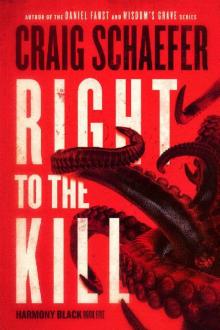 Right to the Kill (Harmony Black Book 5)
Right to the Kill (Harmony Black Book 5)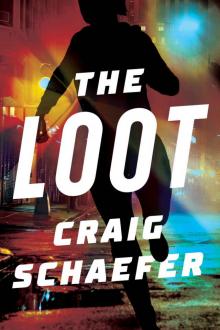 The Loot (Charlie McCabe Thriller)
The Loot (Charlie McCabe Thriller)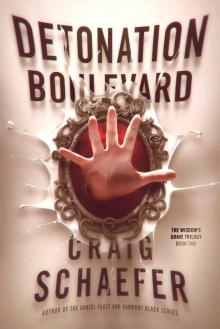 Detonation Boulevard
Detonation Boulevard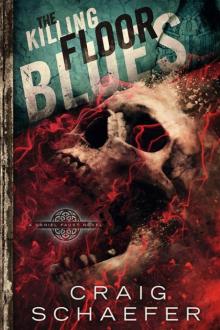 The Killing Floor Blues (Daniel Faust Book 5)
The Killing Floor Blues (Daniel Faust Book 5)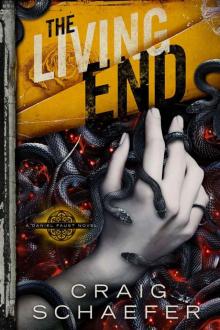 Daniel Faust 03 - The Living End
Daniel Faust 03 - The Living End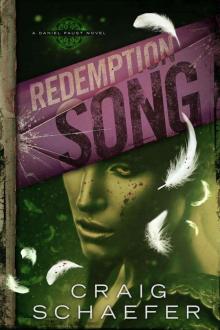 Redemption Song (Daniel Faust)
Redemption Song (Daniel Faust)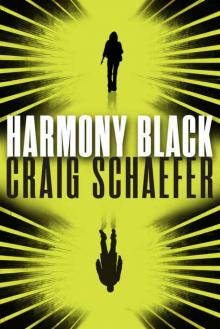 Harmony Black (Harmony Black Series Book 1)
Harmony Black (Harmony Black Series Book 1)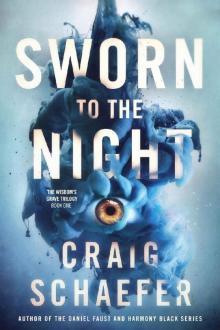 Wisdom's Grave 01 - Sworn to the Night
Wisdom's Grave 01 - Sworn to the Night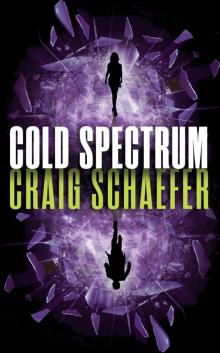 Cold Spectrum
Cold Spectrum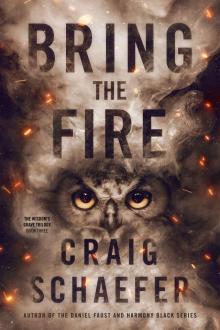 Bring the Fire (The Wisdom's Grave Trilogy Book 3)
Bring the Fire (The Wisdom's Grave Trilogy Book 3)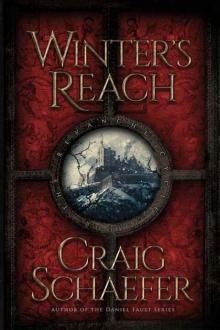 Winter's Reach (The Revanche Cycle Book 1)
Winter's Reach (The Revanche Cycle Book 1)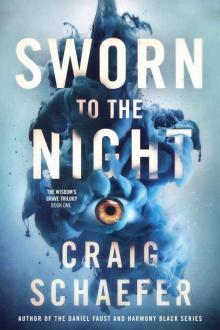 Sworn to the Night (The Wisdom's Grave Trilogy Book 1)
Sworn to the Night (The Wisdom's Grave Trilogy Book 1)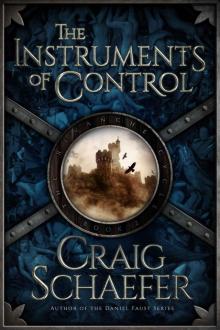 The Instruments of Control (The Revanche Cycle Book 2)
The Instruments of Control (The Revanche Cycle Book 2)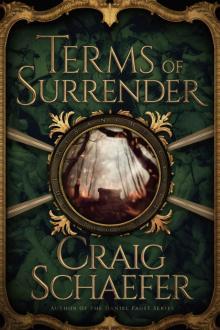 Terms of Surrender (The Revanche Cycle Book 3)
Terms of Surrender (The Revanche Cycle Book 3)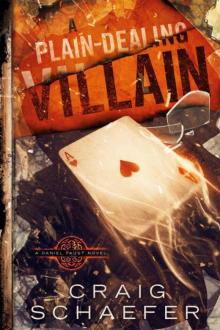 A Plain-Dealing Villain
A Plain-Dealing Villain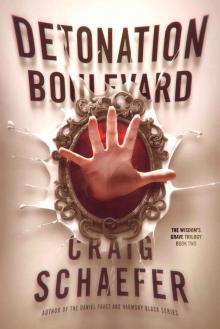 Detonation Boulevard (The Wisdom's Grave Trilogy Book 2)
Detonation Boulevard (The Wisdom's Grave Trilogy Book 2)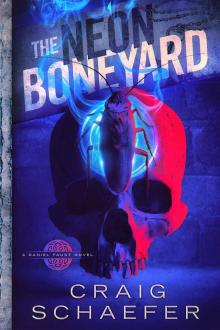 The Neon Boneyard
The Neon Boneyard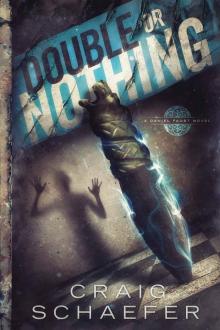 Double or Nothing (Daniel Faust Book 7)
Double or Nothing (Daniel Faust Book 7)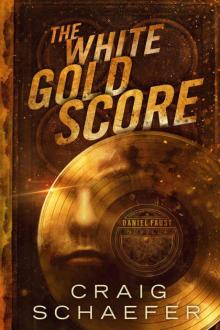 The White Gold Score (A Daniel Faust Novella)
The White Gold Score (A Daniel Faust Novella)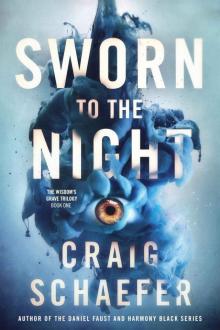 Sworn to the Night
Sworn to the Night